Nielit Scientist-B IT 4-12-2016
Question 1 |
Given a class named student, which of the following is a valid constructor declaration for the class?
Student student(){} | |
Private final student(){} | |
Student(student s){} | |
Void student(){} |
Question 1 Explanation:
A constructor cannot specify any return type, not even void. A constructor cannot be final, static or abstract.
Question 2 |
Three or more devices share a link in ____ connection
Unipoint | |
Polarpoint | |
Point to point | |
Multipoint |
Question 2 Explanation:
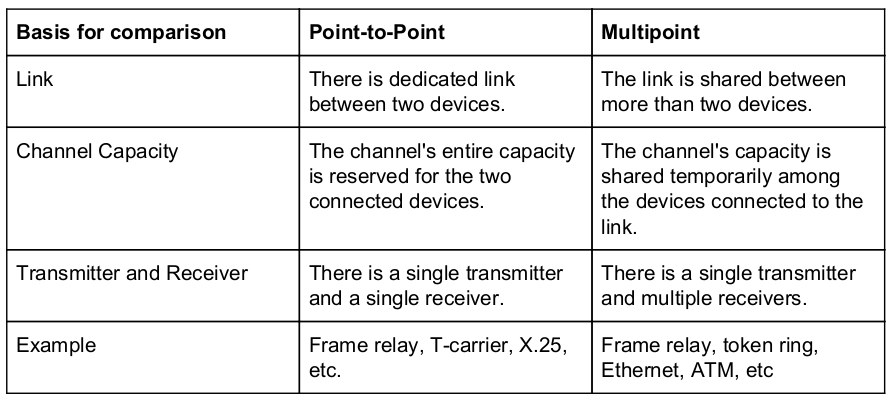
Question 3 |
An object can have which of the following multiplicities?
Zero | |
More than one | |
One | |
All of the above |
Question 3 Explanation:
Multiplicity is a definition of cardinality - i.e. number of elements of some collection of elements by providing an inclusive interval of non-negative integers to specify the allowable number of instances of described element. Multiplicity interval has some lower bound and (possibly infinite) upper bound
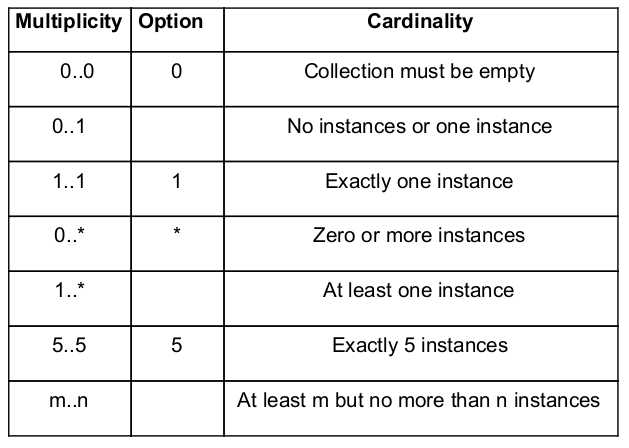

Question 4 |
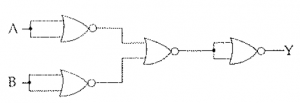
The Circuit is equivalent to:
Ex-OR | |
NAND gate | |
OR gate | |
AND gate |
Question 4 Explanation:
Given circuit diagram consists of NOR gates.
NOR of “A” is A’
NOR of “A” is B’
We can see that (A’ + B’)’ is same as (A.B) , where + represents OR, represents AND and ' represents complement operation. This is a De Morgan’s law.
((A'+B')')'=(AB)'
Where (AB)' is the NAND of AB
NOR of “A” is A’
NOR of “A” is B’
We can see that (A’ + B’)’ is same as (A.B) , where + represents OR, represents AND and ' represents complement operation. This is a De Morgan’s law.
((A'+B')')'=(AB)'
Where (AB)' is the NAND of AB
Question 5 |
Two alternative packages A and B are available for processing a database having 10k records. Package A requires 0.0001n2 time units and package B requires 10nlog10n time units to process n records. What is the smallest value of k for which package B will be preferred over A?
12 | |
10 | |
6 | |
5 |
Question 5 Explanation:
As per given information Package B 10nlog 10 n is lesser than or equals to Package A 0.0001n 2 0
because n 2 is asymptotically larger than nlogn. Finally, 10nlog 10 n ≤ 0.0001n 2
Let n = 10 k records. Substitute into 10nlog 10 n ≤ 0.0001n 2
10(10 k )log 10 10 k ≤ 0.0001(10 k ) 2
10 k+1 k ≤ 0.0001 × 10 2k
k ≤ 10 2k−k−1−4
k ≤ 10 k−5
According to the problem value 6 is suitable for K.
because n 2 is asymptotically larger than nlogn. Finally, 10nlog 10 n ≤ 0.0001n 2
Let n = 10 k records. Substitute into 10nlog 10 n ≤ 0.0001n 2
10(10 k )log 10 10 k ≤ 0.0001(10 k ) 2
10 k+1 k ≤ 0.0001 × 10 2k
k ≤ 10 2k−k−1−4
k ≤ 10 k−5
According to the problem value 6 is suitable for K.
Question 6 |
Earlier name of java programming language was:
OAK | |
D | |
Netbean | |
Eclipse |
Question 6 Explanation:
Oak is a discontinued programming language created by James Gosling in 1991, initially for Sun Micro systems' set-top box project. The language later evolved to become Java.
Question 7 |
What is the type of the algorithm used in solving the 4 Queens problem?
Greedy | |
Branch and bound | |
Dynamic Programming | |
Backtracking |
Question 7 Explanation:
N-Queen problem: an arrangement of N queens on a chess board, such that no queen can attack any other queens on the board.The chess queens can attack in any direction as horizontal, vertical, horizontal and diagonal way. A binary matrix is used to display the
positions of N Queens, where no queens can attack other queens.
Backtracking is a general algorithm for finding all (or some) solutions to some computational problems, notably constraint satisfaction problems, that incrementally builds candidates to the solutions, and abandons a candidate ("backtracks") as soon as it determines that the candidate cannot possibly be completed to a valid solution.
Backtracking is a general algorithm for finding all (or some) solutions to some computational problems, notably constraint satisfaction problems, that incrementally builds candidates to the solutions, and abandons a candidate ("backtracks") as soon as it determines that the candidate cannot possibly be completed to a valid solution.
Question 8 |
selection sort,quick sort is a stable sorting method
True,True | |
False, False | |
True,False | |
False,True |
Question 8 Explanation:
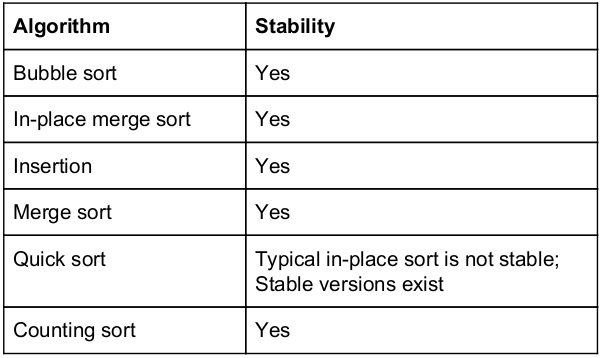

Question 9 |
Which of the following is a platform free language?
Java | |
C | |
Assembly | |
Fortran |
Question 9 Explanation:
Question 10 |
The maximum combined length of the command-line arguments including the spaces between adjacent arguments is:
128 characters | |
256 characters | |
67 characters | |
It may very from one OS to another |
Question 10 Explanation:
Question 11 |
What is the meaning of following declaration?
int(*P[7])();
int(*P[7])();
P is pointer to function | |
P is pointer to such function which return type is array | |
P is array of pointer to function | |
P is pointer to array of function |
Question 11 Explanation:
int *ptr[7]; --This is an array of 7 int* pointers, a pointer to an array of 7 ints
int (*ptr)[7]; --This is a pointer to an array of 7 int
int(*P[7])(); --P is array of pointer to function
int(*P)() ; -- P is pointer to function
int (*ptr)[7]; --This is a pointer to an array of 7 int
int(*P[7])(); --P is array of pointer to function
int(*P)() ; -- P is pointer to function
Question 12 |
Which of the following sorting procedures is the slowest?
Quick sort | |
Merge sort | |
Shell sort | |
Bubble sort |
Question 12 Explanation:
Bubble sort will execute O(n 2 ) time worst case and also it takes n-1 comparisons. So, bubble sort procedure is the slowest one among all.
Question 13 |
The number of unused pointers in a complete binary tree of depth 5 is:
4 | |
8 | |
16 | |
32 |
Question 13 Explanation:
It gives ambitious answer. It may give 32 if root start from 0. It start from means 16.
Question 14 |
Normalization from which is based on transitive dependency is classified as:
First normal form | |
Second normal form | |
Fourth normal form | |
Third normal form |
Question 14 Explanation:
The table is in 3NF if and only if both of the following conditions hold:
1. The relation R (table) is in second normal form (2NF)
2. Every non-prime attribute of R is non-transitively dependent on every key of R.
1. The relation R (table) is in second normal form (2NF)
2. Every non-prime attribute of R is non-transitively dependent on every key of R.
Question 15 |
A__ is a linear list in which insertions and deletions are made to from either end of the structure.
Circular queue | |
Priority queue | |
Stack | |
Dequeue |
Question 15 Explanation:
● A deque, also known as a double ended queue, is an ordered collection of items similar to the queue. It has two ends, a front and a rear, and the items remain positioned in the collection.
● What makes a deque different is the unrestrictive nature of adding and removing items.New items can be added at either the front or the rear.
● Likewise, existing items can be removed from either end. In a sense, this hybrid linear structure provides all the capabilities of stacks and queues in a single data structure.
● What makes a deque different is the unrestrictive nature of adding and removing items.New items can be added at either the front or the rear.
● Likewise, existing items can be removed from either end. In a sense, this hybrid linear structure provides all the capabilities of stacks and queues in a single data structure.
There are 15 questions to complete.
Scientific Assistance 4-12-16
Question 1 |
In the following questions choose the word opposite in the meaning to the given word.
Antagonism:
Antagonism:
Cordiality | |
Animosity | |
Hostility | |
Enmity |
Question 1 Explanation:
→ Actual meaning of Antagonism is active hostility or opposition.
→ Antonyms are hostility, enmity, antipathy, dislike, hatred, aggression.
→ Antonyms are hostility, enmity, antipathy, dislike, hatred, aggression.
Question 2 |
In the following questions choose the word opposite in the meaning to the given word.
Hasten:
Hasten:
Dash | |
Dawdle | |
Hurry | |
Scurry |
Question 2 Explanation:
→ Hasten meaning is be quick to do something.
→ Antonyms are dally, dawdle, dillydally, drag, hang (around or out), lag, linger, loiter, poke, tarry, amble, lumber, plod, saunter, shuffle, stroll.
→ Antonyms are dally, dawdle, dillydally, drag, hang (around or out), lag, linger, loiter, poke, tarry, amble, lumber, plod, saunter, shuffle, stroll.
Question 3 |
In the following questions, out of the four alternatives, choose the one which best expresses the meaning of the given word.
Camouflage:
Camouflage:
Disguise | |
Cover | |
Demonstrate | |
Fabric |
Question 3 Explanation:
→ Camouflage meaning is the disguising of military personnel, equipment, and installations by painting or covering them to make them blend in with their surroundings.
→ Camouflage synonyms are costume, disguise, guise.
→ Camouflage synonyms are costume, disguise, guise.
Question 4 |
In the following questions, out of the four alternatives, choose the one which best expresses the meaning of the given word.
Yearn:
Yearn:
Deny | |
Accept | |
Confront | |
Crave |
Question 4 Explanation:
→ Yearn meaning is have an intense feeling of longing for something, typically something that one has lost or been separated from.
→ Yearn synonym is ache, covet, crave, desiderate, desire, die, hanker.
→ Yearn synonym is ache, covet, crave, desiderate, desire, die, hanker.
Question 5 |
The following pie-chart shows the percentage distribution of the expenditure incurred in publishing a magazine. Study the pie-chart and answer the questions based on it.
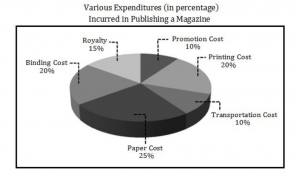
What is the central angle of the sector corresponding to the expenditure incurred on Royalty ?

What is the central angle of the sector corresponding to the expenditure incurred on Royalty ?
15 0 | |
24 0 | |
54 0 | |
48 0 |
Question 5 Explanation:
According to Diagram the circle is in the form of 360°
From that Diagram Expenditure incurred on Royalty is 15%
ஃ 360*(15/100) = 54°
From that Diagram Expenditure incurred on Royalty is 15%
ஃ 360*(15/100) = 54°
Question 6 |
The following pie-chart shows the percentage distribution of the expenditure incurred in publishing a magazine. Study the pie-chart and answer the questions based on it.

The price of the magazine is marked 20% above the C.P. If the marked price of the magazine is ₹ 180, then what is the cost of the paper used in a single copy of the magazine?

The price of the magazine is marked 20% above the C.P. If the marked price of the magazine is ₹ 180, then what is the cost of the paper used in a single copy of the magazine?
₹ 36 | |
₹ 37.50 | |
₹ 42 | |
₹ 44.25 |
Question 6 Explanation:
Let’s C.P = x
M.P = 120 x / 100
From that question M.P of Magazine is = 180/-
Cost of the paper in a single copy = ?
From the above details we have to find out C.P first
180 x = x (120 x / 100)
After solving this
x = 150
Cost of the paper in a single copy
= 150 * (25/100)
= 37.50
M.P = 120 x / 100
From that question M.P of Magazine is = 180/-
Cost of the paper in a single copy = ?
From the above details we have to find out C.P first
180 x = x (120 x / 100)
After solving this
x = 150
Cost of the paper in a single copy
= 150 * (25/100)
= 37.50
Question 7 |
The following pie-chart shows the percentage distribution of the expenditure incurred in publishing a magazine. Study the pie-chart and answer the questions based on it.

If for a certain quantity of magazine, the publisher has to pay ₹ 30,600 as printing cost, then what will be amount of royalty to be paid for these magazines?

If for a certain quantity of magazine, the publisher has to pay ₹ 30,600 as printing cost, then what will be amount of royalty to be paid for these magazines?
₹ 19,450 | |
₹ 21,200 | |
₹ 22950 | |
₹26,150 |
Question 7 Explanation:
Printing Cost=30,600/- that means 20% according to Diagram
Royalty cost=x
∴20 % →30,600
15% →x
Do Cross Multiplication
(20/100) * x=30,600 * (15/100)
x=22,950/-
Royalty cost=x
∴20 % →30,600
15% →x
Do Cross Multiplication
(20/100) * x=30,600 * (15/100)
x=22,950/-
Question 8 |
The following pie-chart shows the percentage distribution of the expenditure incurred in publishing a magazine. Study the pie-chart and answer the questions based on it.

Royalty on the magazine is less than the printing cost by:

Royalty on the magazine is less than the printing cost by:
5% | |
33 (1 / 5 ) | |
20% | |
25% |
Question 8 Explanation:
According to Diagram
Printing Cost = 20%
Royalty Cost = 15%
How much percentage royalty cost is less than printing cost
((20-15) / 20 ) * 100 = 50/2 = 25%
Printing Cost = 20%
Royalty Cost = 15%
How much percentage royalty cost is less than printing cost
((20-15) / 20 ) * 100 = 50/2 = 25%
Question 9 |
The table given here shows production of five types of cars by a company in the year 2010 to 2015. Study the table and answer the questions.

In which year the total production of cars of types P and Q together was equal to the total production of cars of types R and S together?

In which year the total production of cars of types P and Q together was equal to the total production of cars of types R and S together?
2011 | |
2012 | |
2015 | |
None of the above |
Question 9 Explanation:
In this question we have to verify from options, so we can easily find which one is same
P+Q in 2011 -----> 20+10 = 30
R+S in 2011 ------> 17+6 = 23
option A is wrong
P+Q in 2012 ----> 16+14 = 30
R+S in 2012 ----> 16+10 = 26
option B is wrong
P+Q in 2015 ---> 6+14 = 20
R+S in 2015 ---> 31+8 = 39
option C is wrong
So finally option D is correct.
P+Q in 2011 -----> 20+10 = 30
R+S in 2011 ------> 17+6 = 23
option A is wrong
P+Q in 2012 ----> 16+14 = 30
R+S in 2012 ----> 16+10 = 26
option B is wrong
P+Q in 2015 ---> 6+14 = 20
R+S in 2015 ---> 31+8 = 39
option C is wrong
So finally option D is correct.
Question 10 |
The table given here shows production of five types of cars by a company in the year 2010 to 2015. Study the table and answer the questions.

In which year the production of cars of all types taken together was approximately equal to average during the period?

In which year the production of cars of all types taken together was approximately equal to average during the period?
2010 | |
2012 | |
2014 | |
2015 |
Question 10 Explanation:
Take the sum of all cars by years = (88+78+90+87+133) = 476
Average during the period = 476/6 = 79.33.
Year 2014 is approximately equal
option C correct.
Average during the period = 476/6 = 79.33.
Year 2014 is approximately equal
option C correct.
Question 11 |
The table given here shows production of five types of cars by a company in the year 2010 to 2015. Study the table and answer the questions.

The production of which type of cars was 25% of the total production of all types of cars during 2014?

The production of which type of cars was 25% of the total production of all types of cars during 2014?
S | |
R | |
Q | |
P |
Question 11 Explanation:
From that table in 2014 total production of cars was 80.
So,
100% -----> 80
25% ------> x
(25 * 80) / 100 = 20.
From that table 20 cars are from Type S .
So,
100% -----> 80
25% ------> x
(25 * 80) / 100 = 20.
From that table 20 cars are from Type S .
Question 12 |
Read the following information carefully and answer the questions given below:
1.P,Q,R,S,T and U six members of a family each of them engaged in a different profession Doctor, Lawyer, Teacher, Engineer, Nurse and Manager.
2.Each of them remains at home on a different day of the week from Monday to Saturday.
3.The Lawyer in the family remain at home on Thursday.
4.R remains at home on Tuesday.
5.P, a Doctor, does not remain at home either on Saturday or on Wednesday.
6.S is neither the doctor nor the Teacher and remains at home on Friday,
7.Q is the Engineer and T is the Manager.
Which of the following combinations is correct?
1.P,Q,R,S,T and U six members of a family each of them engaged in a different profession Doctor, Lawyer, Teacher, Engineer, Nurse and Manager.
2.Each of them remains at home on a different day of the week from Monday to Saturday.
3.The Lawyer in the family remain at home on Thursday.
4.R remains at home on Tuesday.
5.P, a Doctor, does not remain at home either on Saturday or on Wednesday.
6.S is neither the doctor nor the Teacher and remains at home on Friday,
7.Q is the Engineer and T is the Manager.
Which of the following combinations is correct?
Lawyer-Tuesday | |
Nurse-Friday | |
Manager-Friday | |
Engineer-Thursday |
Question 12 Explanation:

Question 13 |
Read the following information carefully and answer the questions given below:
1.P,Q,R,S,T and U six members of a family each of them engaged in a different profession Doctor, Lawyer, Teacher, Engineer, Nurse and Manager.
2.Each of them remains at home on a different day of the week from Monday to Saturday.
3.The Lawyer in the family remain at home on Thursday.
4.R remains at home on Tuesday.
5.P, a Doctor, does not remain at home either on Saturday or on Wednesday.
6.S is neither the doctor nor the Teacher and remains at home on Friday,
7.Q is the Engineer and T is the Manager.
Which of the following combinations is not correct?
1.P,Q,R,S,T and U six members of a family each of them engaged in a different profession Doctor, Lawyer, Teacher, Engineer, Nurse and Manager.
2.Each of them remains at home on a different day of the week from Monday to Saturday.
3.The Lawyer in the family remain at home on Thursday.
4.R remains at home on Tuesday.
5.P, a Doctor, does not remain at home either on Saturday or on Wednesday.
6.S is neither the doctor nor the Teacher and remains at home on Friday,
7.Q is the Engineer and T is the Manager.
Which of the following combinations is not correct?
R-Teacher | |
Q-Engineer | |
T-Manager | |
S-Lawyer |
Question 13 Explanation:

Question 14 |
Read the following information carefully and answer the questions given below:
1.P,Q,R,S,T and U six members of a family each of them engaged in a different profession Doctor, Lawyer, Teacher, Engineer, Nurse and Manager.
2.Each of them remains at home on a different day of the week from Monday to Saturday.
3.The Lawyer in the family remain at home on Thursday.
4.R remains at home on Tuesday.
5.P, a Doctor, does not remain at home either on Saturday or on Wednesday.
6.S is neither the doctor nor the Teacher and remains at home on Friday,
7.Q is the Engineer and T is the Manager.
Who is the Nurse ?
1.P,Q,R,S,T and U six members of a family each of them engaged in a different profession Doctor, Lawyer, Teacher, Engineer, Nurse and Manager.
2.Each of them remains at home on a different day of the week from Monday to Saturday.
3.The Lawyer in the family remain at home on Thursday.
4.R remains at home on Tuesday.
5.P, a Doctor, does not remain at home either on Saturday or on Wednesday.
6.S is neither the doctor nor the Teacher and remains at home on Friday,
7.Q is the Engineer and T is the Manager.
Who is the Nurse ?
S | |
R | |
U | |
Data inadequate |
Question 14 Explanation:

Question 15 |
Three of the words will be in the same classification the remaining one will not be. Your answer will be the one word that does NOT belong in the same classification as the others.
Which word does NOT belong to the others ?
Which word does NOT belong to the others ?
Tape | |
Twine | |
Cord | |
Yarn |
Question 15 Explanation:
Twine, Cord, Yarn all are similar words.
Tape is Different one.
Tape is Different one.
There are 15 questions to complete.
